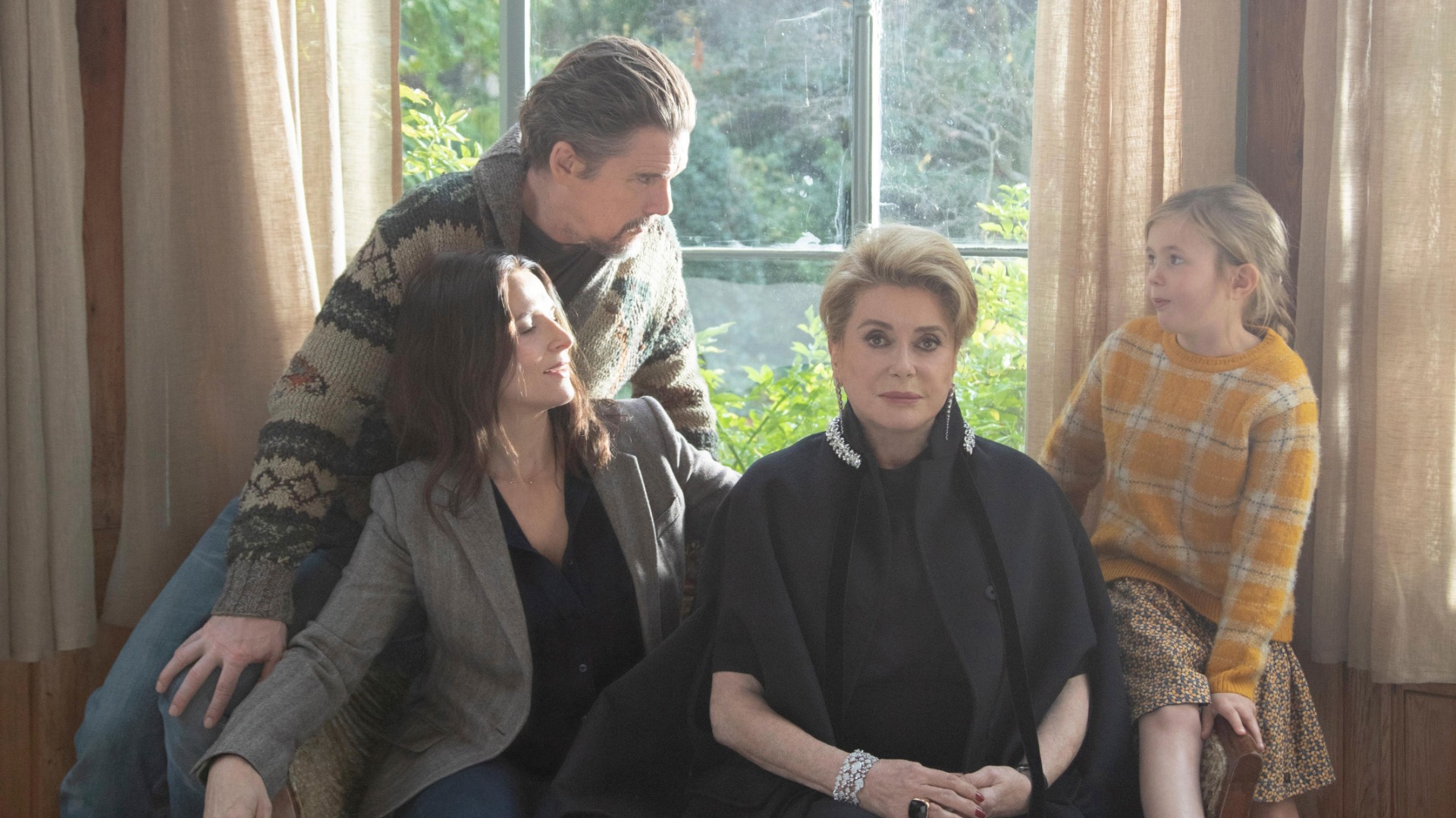If we want to start with the problems of Hirokazu Kore-eda’s The Truth, we can look at the title. When it’s revealed at the beginning that the title comes from the name of a character’s autobiography, it’s a cheeky meta-reference that plays into the film’s own setting of the French film industry. But soon that gives way to revealing that the whole film wants to deal with the concept of truth, the contradictions inherent in the term, and how truth is defined. After all, objectivity can’t really be measured when there’s no such thing as an objective source or observer.
The creator of “The Truth” within The Truth is Fabienne (Catherine Deneuve), a legendary French actress who’s at a point in her life and career where tact no longer applies. Upon the release of her autobiography, she’s visited by her daughter Lumir (Juliette Binoche), son-in-law Hank (Ethan Hawke), and her young granddaughter Charlotte (Clémentine Grenier). As soon as Lumir arrives, she dives into her mother’s book, only to find that almost none of it aligns with her own memory of growing up, leading to confrontations, accusations, and the revival of long-buried resentments, among other truths and mistruths.
I’m not sure why Kore-eda decided to tackle this subject matter, given his track record. It goes without saying that ambiguity is baked right into ideas surrounding subjectivity and memory, but Kore-eda’s films don’t have much ambiguity in them. Shoplifters is straightforward in the way it peels back layers on both narrative and characters, and even Like Father, Like Son’s premise picks a clear side from the beginning (spoiler alert: family isn’t bound by blood). What The Truth wants to explore demands a level of nuance that Kore-eda doesn’t have the ability to provide. As a result, the film feels like watching a square peg trying to fit into a round hole.
This is felt the most in the plotline involving the film Fabienne is filming during her daughter’s visit, a sci-fi/drama called Memories of my Mother. In a nutshell, the film-within-the-film is about a daughter who can only see her ageless mother once every seven years. Early on, when Lumir confronts her mother about her book, one of the lies she mentions involves the description of Fabienne being more of a presence in her life than she actually was, as she spent most of Lumir’s childhood away shooting films. So when Lumir visits the set of Memories of my Mother, she sees some of herself in the scenes between Fabienne–playing the older version of the daughter–and the mother. Binoche communicates this through her reactions alone, but minutes later she explicitly states it, just in case anyone missed the point.
The constant undercutting of what we see, of stating the obvious and therefore removing any ounce of interpretation, escalates throughout, until Charlotte actually blurts out “Is it the truth?” to her mom at one point (Binoche’s reaction, a sly smile followed by laughter, feels like her reacting to the script more than anything). And with the central idea of Kore-eda’s film sputtering out before it can go anywhere, there isn’t too much to take away from this, aside from the performances. Deneuve has a ball throwing out blunt put-downs and Hawke does fine in the cool, ineffective dad role he’s finally aged into, but it’s Binoche who comes out as the MVP, adding layers to her character that were likely nowhere to be found on the page.
But no matter how strong the performances or how assured the direction may be, The Truth can’t shake how, on a writing level, Kore-eda is out of his element. With so many characters finding themselves questioning their own memories and versions of the past, it’s only natural to start asking questions ourselves. But if Kore-eda wants to dictate those questions rather than let viewers ask them on their own, that leaves a lot to be desired. According to Kore-eda, the truth is whatever he tells us it is.
The Truth screened at the Toronto International Film Festival and opens digitally on July 3.

